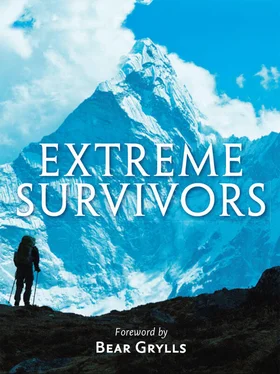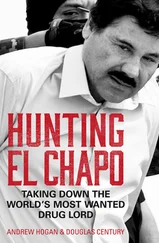By the time they reached Emery and Jillott it was late afternoon. Both men were weakened after a night in the open and Emery had suffered the agony of a dislocated hip when he fell although mercifully this had clicked back into its socket. Streather knew they had to start climbing back out of the basin immediately, even though he and Culbert had now been continuously on the move for thirty hours.
They had climbed 60 m (200 ft) when Culbert’s cramponless foot slipped. He fell from the ice wall and pulled everyone back down into the basin. The men tried again. This time the exhausted Jillott fell asleep in his ropes and again they tumbled back to the bottom.
They tried for a third time but Culbert’s exposed leather sole gave him no grip. Despite valiant efforts he slipped from the sheer ice and swung in space like a pendulum. He was roped to Streather who tried but could not hold his weight. Ripping his partner from his holds, Culbert hurtled back down the same cliff over which Emery and Jillott had tumbled two days earlier.
With savage irony the rescuers had become the victims.
Another night in the arms of death
The sun had set and now it was Emery and Jillott’s turn to climb through the night, returning to the ridge to collect supplies. Meanwhile Streather and Culbert shivered in the darkness of the basin below.
At dawn on 17 August, Emery and Jillot had not returned. Culbert was very weak and frostbite had numbed all feeling in his feet. Streather knew that they had to try for a fourth time to get out of the basin; their colleagues might not have made it.
They would normally have been roped together, but Streather had lost his ice axe and couldn’t have held the younger man if he had fallen. There was no point in both men perishing when one slipped, so they climbed by themselves. Now the full consequences of Culbert’s lost crampon became apparent. He was unable to get the purchase he needed to haul himself up the ice wall. As he tried to follow Streather to the ridge he kept sliding back down. Streather could barely put one foot in front of the other himself; he had no choice but to keep climbing on his own. That climb was the most savage test of endurance he would ever face.
‘I thought I was dead and I didn’t know why I was climbing, but I just knew I had to keep moving.’
Streather eventually reached the ridge and found the rucksack they had left. He was frantic with thirst, but the water bottles were frozen solid. Now all he could do was crawl back to camp.
On the way he was surprised to see a set of tracks diverge from the correct route. Back at the camp he found Emery lying, utterly exhausted, with his cramponned feet sticking out of the tent.
‘Streather asked where Jillott was. Emery said: “He’s gone.” “What do you mean – gone?” “He’s dead. Over the edge.”’
The divergent footprints had been Jillott’s. He had strayed over a precipice and fallen several thousand feet down the south side.
Emery had nearly died himself: he had tumbled into a crevasse and only managed to crawl out that morning, reaching camp a few hours before Streather.
Streather and Emery then talked about going back up for Culbert. But in the cold light of day they knew that was out of the question.
Streather could only get to his feet by levering himself up with ski sticks. Emery was even weaker. Physically they wouldn’t be able to accomplish it and the sad truth was that Culbert was almost certainly already dead after another night in the open.
It was time to face facts: Jillott and Culbert were dead. And unless they got a grip, they would soon be too. Streather got the stove going. Emery, the medic, gave them both penicillin jabs to protect their frostbitten hands and feet from infection.
It took them four more days to get down to base camp. Then they had the heartbreaking job of sending telegrams home to the families of Jillott and Culbert.
The two survivors returned to England where Emery had emergency surgery. All his fingers and toes were amputated. The surgeons managed to leave enough of a stump of his thumb and first finger for him to hold a pen. He got a first in his medical finals. Incredibly he returned to climbing, but died in a fall in the Alps in 1963.
Streather escaped without any amputations. But he still had to face the families of the young men who had died. Doubts, regret and sadness would haunt him ever after.
But beside the tragedy there is another truth. Tony Streather pushed himself to the edge for his friends and Rae Culbert, tragically, gave even more. It was only thanks to their bravery that any men came off that mountain alive. Haramosh was finally climbed on 4 August 1958.

Climbers roped together in search of a way out between the crevasses.
Конец ознакомительного фрагмента.
Текст предоставлен ООО «ЛитРес».
Прочитайте эту книгу целиком, купив полную легальную версию на ЛитРес.
Безопасно оплатить книгу можно банковской картой Visa, MasterCard, Maestro, со счета мобильного телефона, с платежного терминала, в салоне МТС или Связной, через PayPal, WebMoney, Яндекс.Деньги, QIWI Кошелек, бонусными картами или другим удобным Вам способом.













